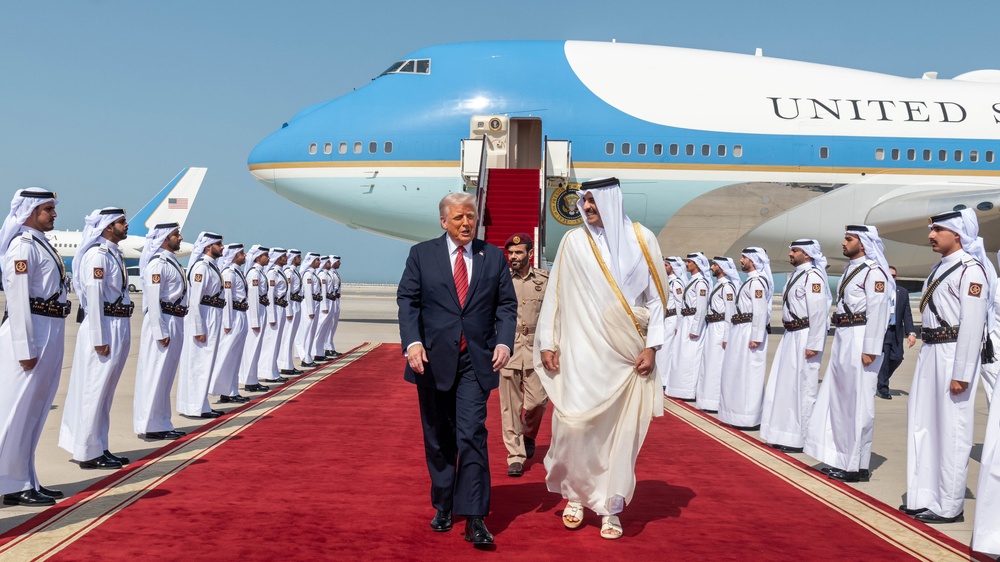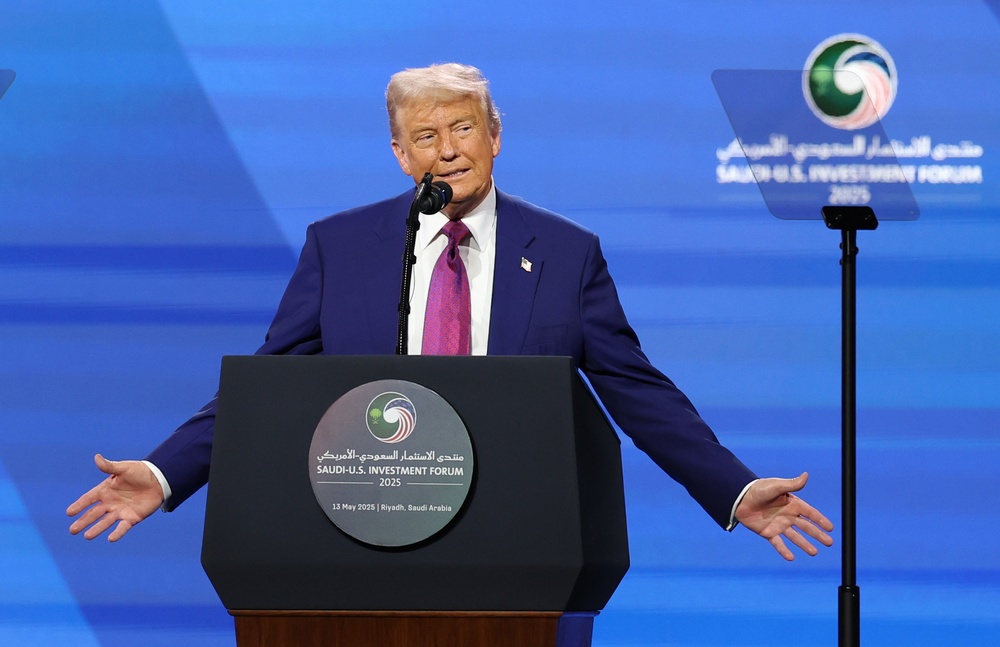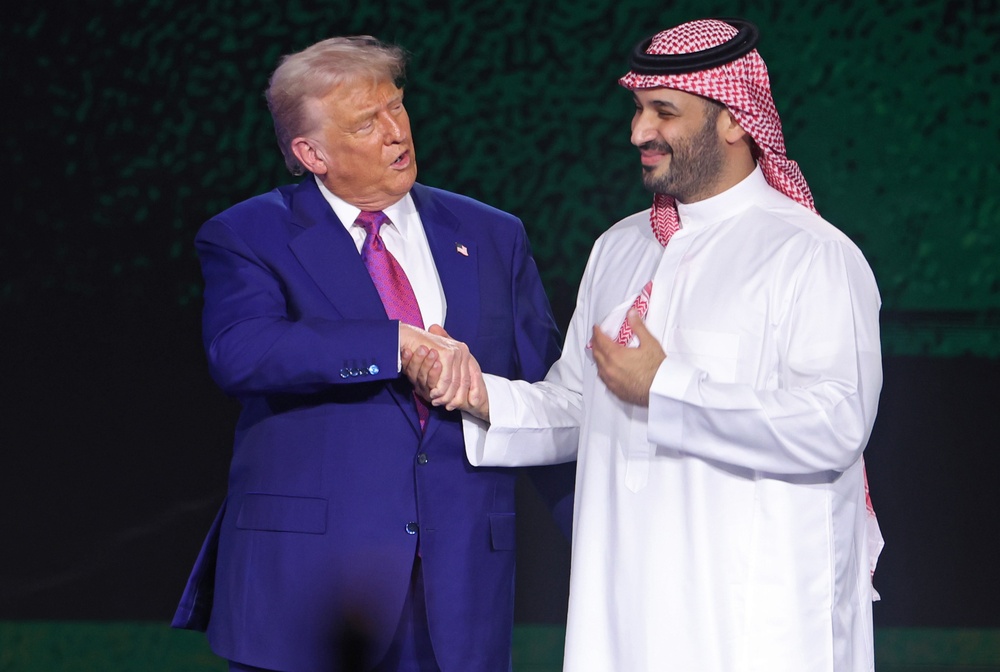
- #Global Issues
- #US Foreign Policy

- President Trump's recent Gulf visit signals a strategic shift in US foreign policy, moving from traditional alliances to a new focus on technology-driven economic collaborations and transactional stability with resource-rich Gulf states, emphasizing shared strategic priorities like countering Iran and securing energy markets.
- The visit, which notably excluded Israel and other key Arab leaders, suggests a potential reshaping of regional alliances and a reduced reliance on Israel, with Gulf leaders pressing Trump on issues like lifting Syria sanctions and promoting an Iran nuclear agreement.
- The trip resulted in an unprecedented $2 trillion in economic and defense deals, primarily in technology, and highlights the Gulf states' ambition to become global AI hubs, solidifying a "Trump Doctrine" that prioritizes mutual economic returns and regional security cooperation.
President Donald Trump has completed his first diplomatic visit of his second term, traveling to Saudi Arabia, Qatar, and the United Arab Emirates. Trump's 2025 Gulf visit aligns with a well-established pattern, reminiscent of his first term when he also initiated his inaugural major diplomatic visit in Riyadh. On this occasion, the scope of the trip was expanded significantly, aiming to explore a much broader range of opportunities. In contrast to his initial Gulf trip in 2017, where the majority of agreements centered on defense, this visit indicated a realignment focused on technology-driven collaborations and positioning the Gulf as a pivotal element in a novel relationship anchored in economic returns and shared strategic priorities. These priorities encompass the prevention of Iran from developing a nuclear weapon, countering its regional influence, preserving regional stability, and securing energy markets and maritime routes, among other objectives.
Trump's Diplomatic Shift
The outcomes of the visit allowed the Gulf leaders of these states to demonstrate a wide range of shared interests, particularly the more obvious ones. This visit, in conjunction with recent actions by the US administration in the Middle East, has led to a growing perception that Israel is being marginalized in major regional developments. It's becoming increasingly apparent that the president and his administration are signaling Washington's intention to reshape the framework of regional alliances, potentially by reducing its reliance on Israel.
The trip also reflects a more intentional US pivot to the Gulf, especially given the key role the region can play in the technological world, the next battlefront between the United States and China. In the president's global business strategy, the Gulf region represents a new and significant opportunity.
This strategic shift by the US president, instead of anchoring US strategy in traditional alliances such as the United Kingdom or Israel, suggests a new focus on partnerships with countries that are resource-rich and stable, offering transactional stability in governance and significant return on investments.
The current period of increased engagement between the US and Gulf countries can be viewed as a strategic partnership, characterized by mutual respect and a focus on mutually beneficial outcomes. The Trump doctrine places greater emphasis on regional return on investment and less on democratization. This approach resonates more strongly with Gulf leaders' preferences and acknowledges their agency as architects for the region's future, rather than merely as clients.
When viewed in conjunction with the optics and symbolism of skipping Israel, Trump's approach could signal a more pragmatic regional posturing that no longer places Israel at the center of Washington's regional relations when it doesn't serve US interests. Gulf capitals are no longer used as bases to project US power, but as strategic anchors in Washington's foreign policy goals.
Gulf leaders pressed Trump to lift sanctions on Syria, which he did, and to promote a nuclear agreement with Iran that would reduce the threat of war. They also urged Trump to use his influence to persuade Israel to end the war in the Gaza Strip, with Saudi Arabia specifically requesting that the issue of normalizing relations with Israel be put on hold for the time being.
During the visit, President Trump's emphasis on reshaping the regional alliance structure became evident, particularly through his calls for conflict resolution and the promotion of stability, which he perceives as vital to achieving his administration's economic goals. In this context, one of the most striking developments was Trump's dramatic decision encouraged by Saudi Arabia and Turkey to meet with Syrian President Ahmed al-Sharaa and his subsequent announcement of the lifting of all US sanctions imposed on Syria since 2019. In his statement on the matter, Trump described the move as one that would provide Syria with an opportunity for economic development. He went on to clarify that this represented a preliminary step towards a process of normalization between the United States and the recently established Syrian regime.
The primary focus of the high-profile visit, Trump's first since returning to the White House, was a series of joint declarations about intentions to promote economic deals. Held from May 13–16 in Saudi Arabia, Qatar, and the United Arab Emirates, the visit also included the Gulf Cooperation Council (GCC) summit he attended. These deals, primarily in the defense and technology sectors, totaled an unprecedented amount of approximately $2 trillion. These agreements, which have not yet been formally endorsed, are outlined as follows: investment and economic cooperation.
Saudi Arabia consented to direct investment in the United States, engage in collaborative endeavors within the oil market and the field of artificial intelligence, enter into a defense pact, and pursue nuclear cooperation. In this particular context, and in contrast to previous reports, it appears that Saudi Arabia hasn't yet received approval for a nuclear program. Furthermore, no significant agreement on this issue was signed during the visit. It is Trump's stated expectation that Saudi investments in the United States will amount to approximately $1 trillion. The total value of agreements publicly disclosed between the United States and Saudi Arabia amounts to approximately $600 billion, encompassing $142 billion in military and defense contracts.
In the context of Qatar, deliberations focused on the augmentation of defense collaboration and investments in the United States. This included a substantial agreement to procure aircraft from Boeing, with an estimated value of approximately $100 billion. In accordance with the statement issued by the White House, President Trump signed an agreement with Qatar, with the aim of fostering mutual trade worth a minimum of $1.2 trillion.
Trump executed a deal with the United Arab Emirates, with a combined value of $200 billion, with a particular emphasis on collaborative initiatives in the domain of artificial intelligence. In addition, concerted efforts were made to promote a security agreement, alongside US expectations for substantial investments amounting to $1.4 trillion from the UAE in American technology over several years.
During the visit, the Gulf monarchs' desire to bestow royal honors on Trump was particularly evident. It appeared that a competition was underway among them for the president's favor, with each striving to outdo the others in the respect and benefits it offered to him. In turn, Trump lavished praise on his hosts, emphasizing his profound appreciation for their leadership and achievements. All parties involved presented the visit as an exceptional success, with both Trump and the Arab leaders highlighting achievements.
It's evident that President Trump perceives close relations with the Gulf states as a significant contribution to US interests, a view shared by the Gulf countries themselves, which are eager to open a new chapter and deepen ties with the United States. The primary beneficiary of this development, in addition to President Trump, is Saudi Crown Prince Mohammed bin Salman, who has gained recognition for both himself and his country as having an upgraded status and as being a central pillar for the United States in the Arab world and the region as a whole.
The visit was instrumental in advancing the diplomatic objectives of both parties.
- Mutual influence on regional policy. In order to strengthen their relations with the United States, the Gulf states must also consider reducing their ties with China to a certain extent, thereby aligning with key American interests.
- The Gulf states' efforts to establish regional status in relation to Iran: The visit provided the Gulf states with an opportunity to demonstrate their capacity to influence the regional agenda concerning Iran, at least during President Trump's term. In exchange for these substantial transactions, it's anticipated that the United States will undertake measures to ensure their security.
- It is vital that energy policy is coordinated to the greatest extent possible. While Trump places significant emphasis on the stabilization of oil prices, for the Gulf states, a fundamental objective is to wield influence over oil prices in exchange for security guarantees.
AI Revolution
The visit of US President Trump to the Middle East, which was marked by an an ostentatious display of power, evoked a range of emotions from envy to shock among the start-up nation and its leaders. This visit revealed only a fraction of the transformation that Saudi Arabia and the United Arab Emirates are planning in the coming years. This transformation is set to be a tectonic shift with dramatic effects on Israel, particularly if it doesn't swiftly become part of this new dynamic.
The narrative is uncomplicated. Saudi Arabia, a Sunni kingdom that possesses the largest area in the Arabian Peninsula and is the world's largest oil exporter, and the United Arab Emirates – a federation of seven emirates and the sixth largest oil exporter in the world – made a decision in principle almost simultaneously, a little less than a decade ago. Their conclusion was that the oil they had extracted thus far had fulfilled its function. The present moment is the opportune time to liberate oneself from this dependence. Both rapidly identified the world's new "oil": artificial intelligence.
The new AI industry, as experienced by the two desert states, has highlighted the necessity for these resources, which are currently in abundant supply. These include financial capital, affordable electricity, extensive land space, rapid construction capabilities, and proximity to regional markets. Nevertheless, the requisite technology companies that are willing to invest in the Middle East, in addition to high-quality manpower, i.e., talent at the level of 8200 (an Israeli Intelligence Corps unit) or MIT graduates, are not present in sufficient numbers. The subsequent stage was to quickly devise ambitious plans to address the existing gaps, thereby rapidly achieving their goals.
The following two figures are solely responsible for the upheaval: Saudi Crown Prince Mohammed bin Salman, aged 39, known as MBS, the son of the elderly and ailing King Salman bin Abdulaziz, and the ruler of the United Arab Emirates, Sheikh Mohammed bin Zayed, aged 64, also known as MBZ. Despite their evident disparities in terms of size, population and tradition – Saudi Arabia's population is three times larger and is considered more conservative – the two countries have been engaged in fierce competition for years, permeating almost all areas of life.
It's evident that both countries possess robust academic institutions that are at the forefront of artificial intelligence research. They both allocate substantial financial resources to research programs in this field and both employ some of the most eminent AI researchers on the global stage. It's evident that the entities in question engage in a pattern of behavior that can be characterized as follows: they emulate the strategies employed by others, they are not averse to the adoption of initiatives that have been successful for others, and they compete for investments from major global companies.
A Trump Doctrine
The present administration has adopted an approach towards the Gulf that is fundamentally different from that of previous administrations. This approach may be termed the 'Trump Doctrine'. The following discussion will therefore examine the form that the new Trump Doctrine is taking and the benefits that the United States stands to accrue from it.
Security
In terms of security, the Gulf Arab states face several challenges, including Iran's missiles and drones, the weakening of Iran's network of proxy militias, and the threat posed by radical Sunni groups, such as the Islamic State group. In order for the United States to maintain its indispensable role as a security provider, it's imperative that it renews Gulf Arab confidence in Washington's security commitment. It's imperative to optimize the distribution of financial and military resources within explicit bilateral and regional frameworks. These frameworks must prioritize the enhancement of the Gulf Arab states' autonomous defense and intelligence capabilities through the sale of arms and technology, the conduct of joint exercises, and the promotion of regional integration. The United States continues to possess a unique capacity for global power projection. Given the Gulf region's paramount strategic significance for Washington's interests, it's imperative to maintain a concentration on the deployment of U.S. capabilities in missile defense, maritime security coordination, intelligence gathering and sharing, and alliance building.
It's evident that both Saudi Arabia and the UAE have sought to establish treaty-bound bilateral security partnerships with Washington, though these efforts haven't yet been realized. In order to promote regional security and safeguard U.S. interests, it's recommended that the new administration continue these discussions. However, it's acknowledged that a Trump Doctrine, if implemented, should seek the broadest possible advantage by involving all six Gulf Arab states and, when possible, Israel. It's imperative that senior U.S. officials undertake regular visits to all Gulf states, thereby fostering strengthened bilateral relationships and augmenting cooperation with the Gulf Cooperation Council, which serves as a unifying body among the Gulf Arab states.
Society and Economy
In terms of both society and the economy, an effective new Trump Doctrine would recognize the significant changes taking place as Gulf economies and societies undergo transformation through top-down reforms to labor markets, the loosening of social restrictions, economic diversification and the transition to alternative energy sources. U.S. companies remain the Gulf’s preferred partners for foreign direct investment, artificial intelligence (AI), and expanding logistics and trade networks. In exchange for access to advanced U.S. technology and investment, Washington should insist that Gulf countries protect U.S. military technology and intellectual property, and increase their extensive existing investments in the United States, as committed to during the president's visit. This would extend the regional and global competitive advantages of both the United States and the Gulf in AI, data processing and other valuable technologies, while simultaneously growing the economies of both regions.
The Carter Doctrine earned its 45-year staying power through conceptual simplicity and the integration of political, economic, and military policy. The administration should combine the United States’ new political objectives, reciprocal economic opportunities, and calibrated security partnerships in the Gulf into a single package: a new Trump Doctrine. This new approach could ensure the United States continues to lead regional security efforts and facilitate positive change in the Gulf Arab states, benefiting both the region and the United States.
Implications
Although Trump’s visit to the Gulf focused on strengthening alliances between the United States and regional states, including Israel, he didn't include Israel in his itinerary. While he emphasized the importance of comprehensive regional normalization, Israel’s absence from the visit contributed to a sense of exclusion from the dramatic diplomatic processes unfolding without its involvement. This omission created the impression that the president and his administration may be signaling to the Israeli government that Washington intends to reshape regional alliances, possibly by reducing its reliance on Israel.
It's worth noting that Israel wasn't the only party excluded. Other key Arab leaders — most notably those from Egypt and Jordan — who had been invited to Gulf summits during Trump’s 2017 visit, were also excluded this time. US policy in the Middle East, and the growing cooperation between the United States and the Gulf states — especially Saudi Arabia — present both challenges and opportunities for Israel and other countries.
Israel must act at all levels to preserve its strategic bond with the White House and ensure that decisions relevant to Israel are only made after consultation with the Israeli government. As part of this, Israel should firmly request a commitment from Washington that no regional security, diplomatic or economic processes will be initiated without prior coordination with Israel. Even in the absence of formal normalization, Israel should work to deepen its ties with Saudi Arabia by strengthening covert channels and promoting a permanent US-regional forum in which Israel would play an active role. In order to safeguard all of these interests, Israel must ensure that its strategy is aligned with the priorities of the Trump administration. Above all, it must carefully consider how to leverage the growing ties between the United States and the Gulf states to advance its own interests. Israel must seize opportunities to strengthen its regional standing, improve its relationship with the US administration and raise its profile on the international stage. The case of Israel provides many implications for South Korea's new administration, which is about to engage in trade negotiations with the United States, including a tariff agreement.

Sung Il-kwang is a prominent South Korean scholar specializing in Middle Eastern studies and currently serves as a research professor at the Institute of Euro-MENA Studies at Sogang University. He holds a Master's degree in Middle Eastern Studies from the Hebrew University of Jerusalem and a Ph.D. in Middle Eastern Studies from Tel Aviv University. His extensive experience includes serving as a Jerusalem correspondent for Yonhap News, leading the Political Economy Research Office at Korea University's Middle East and Islamic Center, and advising the Republic of Korea's Ministry of Foreign Affairs as a policy advisor for the Africa and Middle East Bureau. Dr. Sung is a recognized expert and frequent commentator on Middle Eastern affairs, often featured in broadcast media and online content where he provides analysis on regional developments.

